by Michelle Palmer
“I call myself a feminist. Isn’t that what you call someone who fights for women’s rights?” –Dalai Lama
A few months ago, an anti-feminist article was making the rounds on Facebook, and it showed up in my newsfeed because I had friends liking and sharing it. First, it made me mad. Because I consider myself a feminist. Then it made me frustrated. Because when I actually read it, I realized that the issue was that the author actually didn’t really understand feminism at all. (Then I got mad again because this lady was misinforming my friends!) I, much to my chagrin, didn’t say anything about it at the time.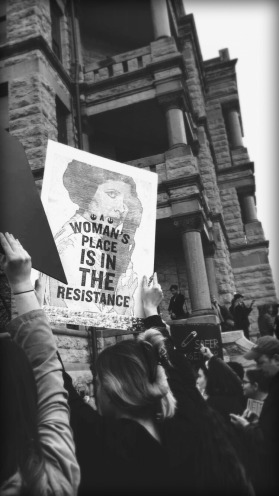
But then this weekend millions of men and women marched for Women’s Rights (and Civil Rights, and Worker’s Rights, and Disability Rights, and Immigrant Rights, and Environmental Rights…), and I saw the complaints and the confusion and the misunderstanding, and it seemed like the perfect time to try and clear up some things about feminism. This blog is about equality, oppression, and freedom, so it seems only natural to try and educate folks who aren’t sure what feminism is all about. And if you think you don’t like the whole feminist thing, this post is especially for you. Please give it a read with an open mind and see what happens…
(Oh, and if you’re a dude, this is definitely for you too. There’s even a special section for ya at the end!)
What is Feminism?
“Quite frankly, it all comes down to the dictionary’s very simple yet profound definition: ‘the theory of the political, economic and social equality of the sexes.’ If that’s what a feminist is – who wouldn’t want to be called that?” – Caroline Dorey-Stein
Another definition, the one that pops up when you Google the word “feminism,” is equally simple: “The advocacy of women’s rights on the basis of the equality of the sexes.” All it means is that we feminists are seeking equal rights and equal opportunity because women are equally valuable. That’s it. That’s the heart of it. Of course, as with any theory, ideology, and movement, there are branches and streams and off-shoots that delve more deeply in various directions, but the heart remains: EQUALITY.
Perhaps some of the confusion comes from the name. Some people may assume that “feminism” means “pro-women,” and if you’re pro-women, you must be anti-men, right? Not so much. The term came from a French philosopher in the 1890s. He used the French term, “feminisme” to talk about “the movement for equal political and legal rights for women.”
“The movement operates on the tenant that gender is not an acceptable basis for discrimination, oppression and/or eradication. It’s called Feminism because the gender being denied personhood and subjected to oppression is female. Feminism was given its name because it began as a socio-political movement to achieve gender equality for females and through its own rhetoric has become a movement to achieve equality for all persons regardless of gender.” – Caroline Dorey-Stein
It’s about raising women up, not tearing men down. It’s about letting women choose if they want to take on traditional roles, not destroying them altogether. It’s about letting little girls choose if they want to play with dolls or legos or footballs and not forcing them to fit into narrow gender stereotypes. (Of course that happens. Of course there are feminists who feel otherwise, but they do not represent the whole of the movement. And thinking they do is like believing the Westboro Baptist Church represents all of Christianity.)
Why Feminism?
It became clear to me over the weekend as I scrolled through my newsfeed that a lot of folks don’t see the need for feminism, much less a march. But here’s a very short, very incomplete list of reasons why we need it:
Gender Pay Gap: “The gender pay gap is real, both in the U.S. and around the world. Men earn more than women on average in every country we examined, both before and after adding statistical controls for personal characteristics, job title, company, industry and other factors, designed to make an apples-to-apples comparison between workers.” You can download the entire report from Glassdoor, by clicking here.
And it’s not just about pay. It’s about maternity leave, it’s about a culture that forces women to choose between family and career (but not men), it’s about the encouragement given to our girls from music, TV, and movies that certain jobs are for them and certain jobs are for men.
 Rape Culture & Gender Based Violence: “When an instance of sexual assault makes the news and the first questions the media asks are about the victim’s sobriety, or clothes, or sexuality, we should all be prepared to pivot to ask, instead, what messages the perpetrators received over their lifetime about rape and about ‘being a man.’ Here’s a tip: the right question is not, ‘What was she doing/wearing/saying when she was raped?’ The right question is, ‘What made him think this is acceptable?’ Sexual violence is a pervasive problem that cannot be solved by analyzing an individual situation.”
Rape Culture & Gender Based Violence: “When an instance of sexual assault makes the news and the first questions the media asks are about the victim’s sobriety, or clothes, or sexuality, we should all be prepared to pivot to ask, instead, what messages the perpetrators received over their lifetime about rape and about ‘being a man.’ Here’s a tip: the right question is not, ‘What was she doing/wearing/saying when she was raped?’ The right question is, ‘What made him think this is acceptable?’ Sexual violence is a pervasive problem that cannot be solved by analyzing an individual situation.”
- 10 Things to End Rape Culture
- Rape Culture from the Center for Relationship Abuse Awareness
- Position Paper on Gender Based and Sexual Violence on College Campuses
Unequal Representation: “Governments are meant to represent the people who elect them. And yet it is only once women gain political power that subjects considered to be ‘soft’ are dealt with seriously – from child care and reproductive rights to education and sustainability.” – Avivah Wittenberg-Cox
More stats on women in government here.
And about a million other reasons which you can find here and here. (Seriously, if you’re not yet convinced, please click those links.)
And just a side note here, because I have been seeing this as an argument against the feminist movement: If you haven’t ever faced discrimination or hardship based on your gender, if you feel you have no personal need for feminism, that’s genuinely fantastic. And that’s what we want for ALL women. Just because it doesn’t happen to you doesn’t mean it doesn’t happen, and the rest of us would benefit from your solidarity.
Why the March?
“I wanted to be here because I have seen that Trump does not treat women right. They are human, and they should have the same rights as men.” – 13 year old (male) protester, Kirill Fisher
Now as for the march, the organizers did a fine job of explaining it all on the website, and you can read about it in detail here. TL;DR: “This march is the first step towards unifying our communities, grounded in new relationships, to create change from the 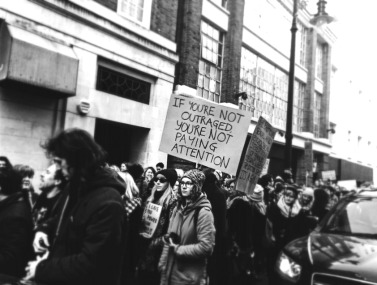 grassroots level up. We will not rest until women have parity and equity at all levels of leadership in society. We work peacefully while recognizing there is no true peace without justice and equity for all.” (Emphasis mine)
grassroots level up. We will not rest until women have parity and equity at all levels of leadership in society. We work peacefully while recognizing there is no true peace without justice and equity for all.” (Emphasis mine)
It’s more than just a one day event. My friend Harper posted photos of the march in Des Moines, with this caption: “I march for respect, for rights, for love, and for unity. Feeling empowered and ready to move forward…together.” The March was a massive statement in and of itself, but it’s also catalyst for the next steps. It was a mobilizing, energizing, rallying cry that women will stand up for the rights of each other and the rights of the oppressed. And I have friends in California already making plans to host a group to start working on the 10 Actions for the First 100 Days.
One argument I’ve heard against the March was that we women have it really good in the USA, especially compared to the rest of the world. Constance Hall had the perfect response to that line of reasoning, so I’ll share it here:
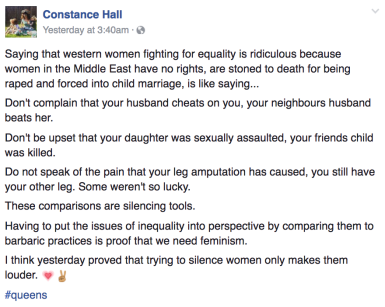
And beyond that, we’re the USA! The eyes of the world are upon us. Especially now in our season of transition. And as our women marched, so did women on every other continent on the globe. How can we be the “greatest country in the world” if we don’t set the example for gender equality? It starts with us.

You can read a whole collection of personal reasons for marching here. (Again, if you’re not convinced the March was a good idea, CLICK. THAT. LINK. Seriously.)
And if you haven’t already, check out Channon’s post on The Power of Peaceful Protest.
Addressing the A-Word:
Because of some of the headlines about the Women’s March, I planned to say a quick word on abortion to avoid the inevitable questions that would come up if I didn’t. I then realized that it would be impossible to properly discuss the wide range of opinions on the matter in any sort of “quick” way. While some believe that a pro-choice stance is central to feminism, I don’t. And I believe that there are ways for pro-life and pro-choice feminists to work together to achieve mutual goals of female empowerment resulting in a decreased need for abortion. I’ve said it before and I’ll say it till I die: We don’t have to agree on everything to work together to make the world a better place for everyone. Furthermore, changing laws is sometimes helpful, but it’s not the only way to create real and lasting change. I hope to discuss this further in a future post regarding some actual data and evidence that will show that much of the feminist agenda attacks and alleviates the very reasons that women choose abortion.
Men, We Need You Too
“All men should be feminists. If men care about women’s rights, the world will be a better place. We are better off when women are empowered — it leads to a better society.” – John Legend
Okay, guys, this isn’t just a “woman’s issue.” This is your issue too. If you don’t believe me, there are a bunch of famous men who say so too. Check it out here.
- “They do not believe their self-worth and masculinity is tied to how many women they have sex with, how physically strong they are, and how many people they can beat up. But they are socially encouraged to do so and fear punishment from other men if they stand up to those beliefs. Feminism is as much for men as it is for women in order to free them from the sexist and oppressive beliefs that they don’t want to have.” – From Why Feminism Is For Everyone by Sandra Kim
- “What if both boys and girls were raised not to link masculinity and money? What if their attitude was not ‘the boy has to pay,’ but rather, ‘whoever has more should pay.’ Of course, because of their historical advantage, it is mostly men who will have more today. But if we start raising children differently, then in fifty years, in a hundred years, boys will no longer have the pressure of proving their masculinity by material means. But by far the worst thing we do to males—by making them feel they have to be hard—is that we leave them with very fragile egos. The harder a man feels compelled to be, the weaker his ego is.” – From We Should All Be Feminists
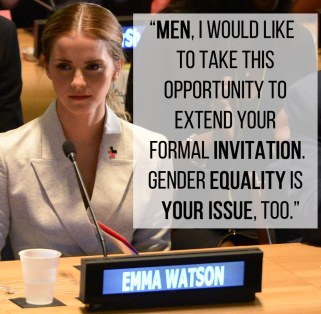
If you want to get involved (and I really, really, really hope you do), check out the UN’s HeForShe Campaign. My favorite feminist, Emma Watson, personally invites you to do so!
Check out the website (http://www.heforshe.org/en), like the Facebook page (https://www.facebook.com/HeForShe/), and also watch Emma and Lin-Manuel Miranda be adorable and chat all about it (https://www.youtube.com/watch?v=-NbEbkVrVWY).
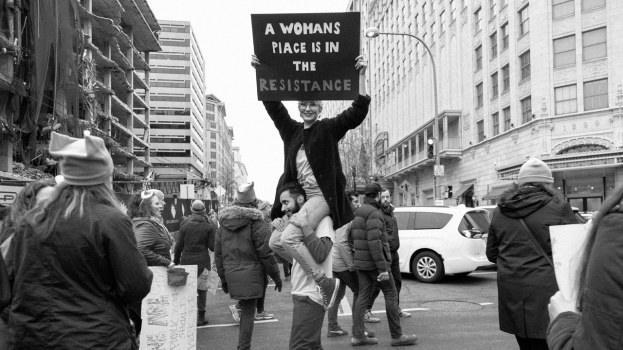
For more information….
- Feminism Has a Bra-Burning Myth Problem
- Feminism: Why Not ‘Egalitarianism’ or ‘Humanism’? by Caroline Dorey-Stein
- A Brief History: The Three Waves of Feminism by Caroline Dorey-Stein
- A Short History of Male Feminism
- Lots of research on representation and why it matters: https://seejane.org/research-informs-empowers/
- We should all be feminists | Chimamanda Ngozi Adichie | TEDxEuston
- Tuesday Justice “Feminism” Pinterest Board (Lots of great quotes and helpful comics to explain feminism.)
- New World Encyclopedia: Feminism
- Things I learn from the Haitian people: There are no such things as love handles. by Fée-Anke De Hoog Cius


[…] see, the truth is that even though feminism matters and there is some good to be said about Wonder Woman, the film is not intersectional; it’s not […]
LikeLike
[…] a specific item) or by cause (there are over a dozen to choose from), including human trafficking, women’s empowerment, and refugee […]
LikeLike
[…] and ending sexual harassment. If you don’t know why it’s a big deal, read on. (And/or check out our earlier post on feminism.) These stats come from the Time’s Up website, and each has links to its source. […]
LikeLike